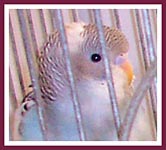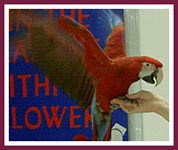|  According to the
American Pet Products Manufacturers Association, there are 17.5 million
companion birds in the US, or 1 in 7 households have a pet bird. Most of these
birds are sold to people through pet stores. I receive many complaints from
concerned people throughout the state regarding the conditions birds are kept
in at pet stores. I refer these people to their local humane societies for
help, where the humane society is powerless to take action. Some examples of
the complaints I receive are dirty water, dirty food, dirty cages, overcrowded
cages, sick birds, un-weaned birds, inappropriate perches and no perches.
(Click on photo at left or see Photo # 20, Pet Store
Parakeets.) According to the
American Pet Products Manufacturers Association, there are 17.5 million
companion birds in the US, or 1 in 7 households have a pet bird. Most of these
birds are sold to people through pet stores. I receive many complaints from
concerned people throughout the state regarding the conditions birds are kept
in at pet stores. I refer these people to their local humane societies for
help, where the humane society is powerless to take action. Some examples of
the complaints I receive are dirty water, dirty food, dirty cages, overcrowded
cages, sick birds, un-weaned birds, inappropriate perches and no perches.
(Click on photo at left or see Photo # 20, Pet Store
Parakeets.)
Over the past
few years, I have attended numerous educational seminars given by highly
respected avian veterinarians here, such as Dr. Sakas, Dr. Joanne Paul Murphy
and Dr. Pere. These avian veterinarians talk about the health dangers of dirty
water, food and cages. They talk about how quickly bacteria breed in a dirty
environment and how quickly a bird can become sick. They go on to point out how
quickly diseases from one bird to another can spread and also from bird to
human. Unsanitary conditions in pet stores are very harmful to birds, and
humans.
Improper
perch sizes, or perches the same size cause birds to develop sores under their
feet, like open wounds, which can lead to infection. Selling un-weaned chicks,
that is, taking the baby away from its mother too soon and selling to
inexperienced customers to hand feed, leads to many of these birds dying from
being overfed and suffocating, being underfed and starving, or burning the
bird's throat from feeding formula too hot.
 Overcrowded cages add
stress to the animal. Birds get less food, and must fight for a perch. The cage
becomes dirtier faster and diseases between birds spread faster too. Overcrowded cages add
stress to the animal. Birds get less food, and must fight for a perch. The cage
becomes dirtier faster and diseases between birds spread faster too.
Birds are
masters at hiding illness. They use all their strength to hide their illness.
As we rescuers have been taught by avian vets what to look for, when the bird
starts to show signs of illness, we take immediate action to save its life.
Birds sitting fluffed up in a corner, or having diarrhea are two signs we look
for.
What does the
pet store do with their sick birds? Well, they try to sell them to you. At some
point the bird disappears. I have received information that some pet stores put
these sick birds in plastic bags in the refrigerator as a way to kill them out
of sight. When the bird dies the store can then submit the bird to their vendor
for a refund. It is cheaper than calling the vet. How many pet stores have an
avian vet who visits regularly?
Also, keep in
mind some of the diseases birds can get can transfer to humans, such as
psittacosis. This is a fatal disease in birds, and can bring severe flu like
symptoms to humans. Dirty cages, water and food increase the chances of such
outbreaks, and help the disease spread faster. People may not know the bird is
sick, and bring it home where their entire family then becomes ill.
If you are
considering bringing a bird into your household, PLEASE do your homework -- and
that includes investigating adopting from a rescue or finding a resonsible
breeder!
|




